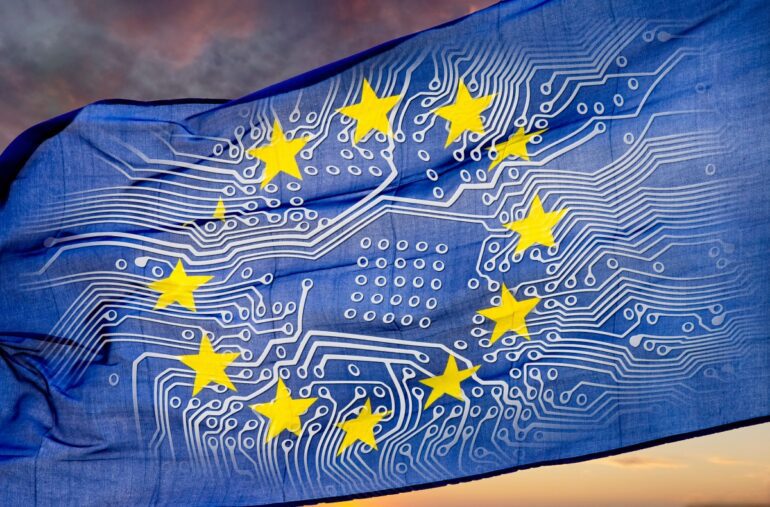TL;DR:
- Wednesday marked a crucial moment in Brussels as the EU’s groundbreaking AI regulation proposals entered the final legislative stage.
- Disagreements center on regulating “foundation” AI models, with high costs and global dominance by a few firms.
- Foundation models are vital as they underpin countless new applications; flaws in them can impact the entire AI landscape.
- France, Germany, and Italy shifted towards advocating less intrusive regulation, favoring self-regulation by companies.
- Corporate lobbying appears to influence this shift, raising concerns about the balance between innovation and oversight.
Main AI News:
In the bustling world of technology, Wednesday marked a pivotal moment in Brussels, a city often distant from the thoughts of post-Brexit Britain. It was the day when the European Union’s ambitious AI proposals reached the climax of a complex legislative journey. This groundbreaking bill, the first of its kind globally, aims to impose substantial regulations on artificial intelligence (AI) by evaluating its potential to cause harm. The proposal now enters the crucial phase of “trilogues,” where the EU Parliament, Commission, and Council collaborate to shape the bill into European law. It’s a day of high stakes and significant implications for all stakeholders involved.
However, the fate of this bill now hangs in the balance, as internal disagreements regarding key aspects of the legislation threaten its progress. A central point of contention revolves around the regulation of “foundation” AI models, those trained on massive datasets. In EU terminology, these are referred to as “general-purpose AI” (GPAI) systems, capable of a wide range of tasks, including text synthesis, image manipulation, audio generation, and more, exemplified by models like GPT-4, Claude, Llama, and their counterparts. The development and training of these systems come at an exorbitant cost, with the salaries of the experts involved reaching Premier League striker levels and beyond. Even a single 80GB Nvidia Hopper H100 board, a crucial component of machine learning hardware, commands a price tag of £26,000. Building a robust system requires thousands of these boards. Consequently, only about 20 global firms possess the financial capacity to engage in this high-stakes game, and they have deep pockets to sustain their endeavors.
So why are these foundation models of such significance? The answer lies in their very name – they serve as the bedrock upon which the future of technology is constructed. Much like the early 1990s internet, which laid the groundwork for today’s online world, GPAIs are poised to underpin countless new applications, primarily driven by small companies and startups. Any issues, such as flaws, security vulnerabilities, or manipulative algorithms, within these foundational models will inevitably reverberate throughout the interconnected global landscape.
To draw a metaphorical parallel, envision constructing a new global system for delivering drinking water. GPAIs are akin to colossal reservoirs from which both corporations and individuals will draw their metaphorical “water.” At present, every one of these reservoirs is owned and controlled by American companies. Therefore, it becomes crucial to understand how the water in these reservoirs is filtered, purified, and enhanced. What additives, preservatives, microbes, and supplements have the reservoir owners introduced?
At the heart of the ongoing debates in Brussels lies a fundamental conflict of interest: the tech giants, akin to reservoir owners, are reluctant to allow regulators to scrutinize their operations. Until recently, many members of the European Parliament, the EU’s sole central democratic institution, remained committed to incorporating such scrutiny into the AI legislation.
However, a surprising twist occurred when the governments of France, Germany, and Italy united in advocating for less intrusive regulation of foundation models. According to these three nations, Europe requires a “regulatory framework that fosters innovation and competition, allowing European players to emerge and represent our values on the global AI stage.” They argue that the right approach is not to impose legal regulations on the predominantly American companies dominating the AI landscape but to allow for self-regulation through “company pledges and codes of conduct.”
But can we realistically hope for ethical behavior from corporations with a track record of prioritizing shareholder value over broader societal welfare? Recent events, such as the abrupt replacement of OpenAI’s board, ostensibly tasked with ensuring the ethical use of foundation models, with individuals driven by profit maximization, raise valid concerns.
Regrettably, the sudden shift in stance by France, Germany, and Italy can be attributed to a more cynical explanation: the overwhelming influence of corporate lobbying in Brussels and European capitals. In this context, it’s worth noting that while Sam Altman, both former and current CEO of OpenAI, tirelessly advocated for global AI regulation, his company quietly lobbied behind the scenes for changes in the EU’s AI act that would reduce regulatory burdens, even contributing text to a recent draft of the bill.
Conclusion:
The ongoing struggle in Europe over AI regulation reflects a pivotal moment in the tech industry. The battle between stringent oversight and self-regulation driven by corporate lobbying will shape the future of AI innovation and competition. Europe’s decisions will not only impact its own tech landscape but will reverberate throughout the global market, influencing the ethical standards and market dynamics of AI technologies worldwide.

